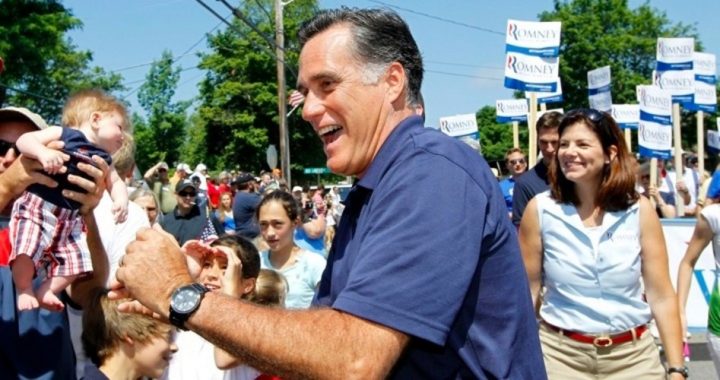
Presumptive Republican presidential nominee Mitt Romney has reassured the electorate that he agrees with the Supreme Court’s ruling that the infamous “individual mandate” that is the cornerstone of the Affordable Health Care Act — i.e. “ObamaCare” — is a tax.
This comes just days after one of Romney’s advisers, Eric Fehrnstrom — presumably speaking on behalf of the former Massachusetts governor — described the mandate as a penalty, not a tax.
The apparent inconsistency between Fehrnstrom’s characterization of the unpopular mandate and the more recent description offered by Romney has exposed the latter to the all-too-familiar charge that he is a “flip flopper.”
However, whatever grounds critics may have for regarding Romney as a man whose positions on the issues come and go with the political winds, their conclusion in this instance may have been drawn in haste. On the Fourth of July, while speaking with CBS News, Romney stated his view clearly and succinctly. “The Supreme Court has spoken,” he said. Although his sympathies lie with the dissent, the fact of the matter is that the majority declared that it is a tax. “They have spoken,” Romney asserted, “there is no way around that.”
Romney’s position here is no different from that taken by the American majority that has opposed ObamaCare from the beginning. For that matter, it isn’t clear that his adviser’s perspective is out of sync with either the Republican Party or the American mainstream that rejects Obamacare as a historically unprecedented encroachment on their liberties. After all, the same people who despised the president’s signature legislation prior to Justice John Roberts’ unanticipated opinion remain equally disdainful of it today. All that has changed, though, is that they now despise the Court’s majority ruling just as much.
Along with the majority of his fellow Americans who wish to see Obamacare repealed, Romney insists that the court should not have ruled that the mandate is constitutional as a tax. But in his July 4 interview, Romney also says it’s now constitutional because the court says it’s constitutional. In Romney’s own words:
The Supreme Court has the final word. And their final word is that Obamacare is a tax. So it’s a tax. They decided it was constitutional. So it is a tax and it’s constitutional. That’s the final word. That’s what it is.
Undoubtedly, unlike the presumptive Republican standard-bearer, many of those who believe that ObamaCare was unconstitutional prior to the court’s ruling still believe that ObamaCare is unconstitutional after the court’s ruling — despite what the court said. They may agree with Romney that ObamaCare is a tax while disagreeing with him that it’s constitutional.
But it is the question of flip-flopping, and not Romney’s view that the Supreme Court is the final arbiter of what is constitutional, that has generated media attention over Romney’s remarks on the court’s decision. Even if Romney can successfully defy the allegation that his stance on ObamaCare is but the latest instance of his flip flopping, his supporters concede that he is now vulnerable on a new front: Romneycare. Romney has always insisted that as the governor of Massachusetts, he never once raised taxes. But if the individual mandate of ObamaCare is a tax, then it appears that the individual mandate of Romneycare — the universal health are system for the residents of Massachusetts to which Romney gave rise—is also a tax.
Romney, though, thinks otherwise.
Actually the chief justice, in his opinion, made it very clear that, at the state level, states have the power to put in place mandates. They don’t need to require them to be called taxes in order for them to be constitutional. And as a result, Massachusetts’ mandate was a mandate, was a penalty, was described that way by the legislature and by me. And so it stays as it was.
Whatever one thinks of Romney’s responses to the challenges that this Supreme Court decision poses to his campaign, the president and his supporters should proceed with caution when launching their attack against their opponent.
Prior to the Supreme Court decision, President Obama repeatedly stated that the individual mandate is not a tax. For example, in September of 2009 while being interviewed by George Stephanopoulos, Obama said in no uncertain terms that “I absolutely reject that notion” that the mandate is a tax increase.
In his press conference following the ruling, Obama stated triumphantly that “the highest court in the land has now spoken” on the constitutionality of his healthcare act. Yet it had also blatantly contradicted the President’s protestations against his critics’ claim that the mandate is the largest middle class tax increase in American history.
Obama’s opponents wasted no time in exploiting his political vulnerability on the issue. Sarah Palin, for example, immediately tweeted: “Obama lied to the American people. Again. He said it wasn’t a tax. Obama lies; freedom dies.”
Obama is now just as susceptible to the charge of flip flopping as Romney had ever been. Also, the very same Supreme Court upon whose authority he depends to lend constitutional legitimacy to Obamacare is the Court that has now made him the owner of a tax increase unrivaled in size and kind.
Photo: Mitt Romney at July 4 parade: AP Images



